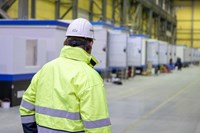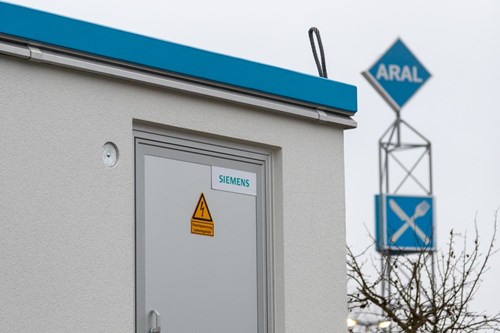
Aral AG, a subsidiary of the bp group in Germany, has tasked Siemens Smart Infrastructure with expanding the grid connection at 30 selected gas stations. The installation of intelligent substations allows Aral to upgrade its gas stations with ultra-fast charging technology for electric vehicles. The installation is expected to be completed by the end of February.
The expansion of the public charging infrastructure is an essential requirement for the acceleration of electric mobility. The joint project between Aral and Siemens is an important contribution to creating public fast-charging stations.
“By equipping our gas stations with charging infrastructure for electric vehicles, we are taking a major step forward in creating the gas station of the future,” said Patrick Wendeler, member of the Managing Board of Aral AG. “To make charging as fast as putting fuel in your car, we have opted for ultra-fast charging stations with a power of up to 350 kW. But chargers alone are not enough: The retrofit also requires a powerful and reliable grid connection. That is why we are glad to have Siemens with its expertise in electrical infrastructure at our side.”
Most gas stations currently only have a low-voltage connection. To meet the increased power demand of fast chargers, the grid connection needs to be upgraded to a medium-voltage connection with much higher power. This is achieved through the substations which connect the gas stations’ charging infrastructure to the public power grid. Each substation consists of a hermetically capsulated transformer, a gas-insulated medium-voltage switchgear, type 8DJH, and a Sivacon S8 low-voltage switchboard.
 By using communicating hardware and Internet of Things (IoT) technology, Aral can obtain information about the status of the substations at any time. This will enable the blue-and-white labeled service station brand to guarantee their customers the full functionality of its ultra-fast charging stations even better than today. The utilization of sensors helps to generate data, thereby ensuring continuous monitoring of the health status and a safe operation of the equipment. These values are then transmitted over communication interfaces to a higher-level, cloud-based IoT system. The data is evaluated and visualized via a web application in a useful addition to those of the fast charging stations.
By using communicating hardware and Internet of Things (IoT) technology, Aral can obtain information about the status of the substations at any time. This will enable the blue-and-white labeled service station brand to guarantee their customers the full functionality of its ultra-fast charging stations even better than today. The utilization of sensors helps to generate data, thereby ensuring continuous monitoring of the health status and a safe operation of the equipment. These values are then transmitted over communication interfaces to a higher-level, cloud-based IoT system. The data is evaluated and visualized via a web application in a useful addition to those of the fast charging stations.
About Siemens
.png) Siemens Mobility is a separately managed company of Siemens AG. As a leader in transport solutions for more than 160 years, Siemens Mobility is constantly innovating its portfolio in its core areas of rolling stock, rail automation and electrification, turnkey systems, intelligent traffic systems as well as related services. With digitalization, Siemens Mobility is enabling mobility operators worldwide to make infrastructure intelligent, increase value sustainably over the entire lifecycle, enhance passenger experience and guarantee availability. In fiscal year 2020, which ended on September 30, 2020, Siemens Mobility posted revenue of €9.1 billion and had around 38,500 employees worldwide.
Siemens Mobility is a separately managed company of Siemens AG. As a leader in transport solutions for more than 160 years, Siemens Mobility is constantly innovating its portfolio in its core areas of rolling stock, rail automation and electrification, turnkey systems, intelligent traffic systems as well as related services. With digitalization, Siemens Mobility is enabling mobility operators worldwide to make infrastructure intelligent, increase value sustainably over the entire lifecycle, enhance passenger experience and guarantee availability. In fiscal year 2020, which ended on September 30, 2020, Siemens Mobility posted revenue of €9.1 billion and had around 38,500 employees worldwide.




Comments
There are no comments yet for this item
Join the discussion